History
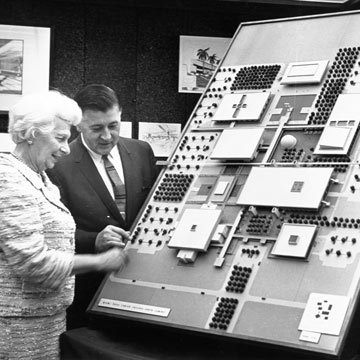
Opening Doors
Miami Dade College opened its doors in 1960 with just under 1,500 students on land that was once a World War II Naval air station. Dade County Junior College (DCJC), as it was known at the time, was founded amid the era of Civil Rights, desegregation and an influx of asylum-seekers from Cuba. The student body included seven black students who made DCJC the first integrated junior college in Florida, along with Cuban refugees seeking a better life in America. The College was open to any Miami-Dade County resident who had graduated from high school. Tuition was free to all county residents.
The institution’s first graduating class had fewer than 200 students. By the mid-1960s nearly 15,000 students were attending the original North Campus, its buildings bursting at the seams. While new construction got underway at the College’s first campus, plans were made for a second campus in Kendall and a third in Downtown Miami. South Campus (Kendall) would open in 1964.
With more than 23,000 students by 1967, DCJC was the fastest growing junior college in the U.S. and the largest institution of higher learning in the state of Florida. During this era of tremendous growth, the College enrolled more freshmen than the University of Florida, Florida State University and the University of South Florida combined.
In 1968, the Florida Legislature separated community colleges from the public school system and the College was then governed by its own District Board of Trustees.
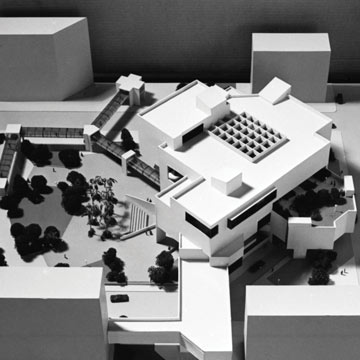
Access with Excellence
A philosophy of “access with excellence” defined the 1970s for the College. A bold institutional review reaffirmed its open-door policy, set new academic goals and raised the standard for all community colleges across the country. Dr. K. Patricia Cross, 20th century thought leader and then-visiting professor at Harvard University’s Graduate School of Education, called the College “the most exciting institution of higher education in the country.”
The campus in Downtown Miami officially opened in 1970 and would later be renamed for one of the College's founders, Mitchell Wolfson.
In 1973 the College changed its name to Miami-Dade Community College (MDCC) after residents voted to change the name of the county from Dade to Miami-Dade in order to take advantage of the international name recognition of Miami.
Medical Campus opened its doors in 1976 in the heart of Miami’s flourishing medical district as the College’s fourth campus.
Bilingual studies became a full-fledged division in 1979, with more than 2,000 students enrolled in outreach centers in Little Havana, making it the largest bilingual program in all of higher education.

Unprecedented Achievement
In the 1980s, burgeoning MDCC reflected the greatly expanding diversity of South Florida. During this period, 30% of the College’s students were immigrants; English was not the native language for 46%; two-thirds were minorities; and 56% were women. Part-time students were the norm as those seeking credentials for greater earning potential continued to work to support themselves and their families.
A modest College-sponsored book fest, "Books by the Bay," was held in 1983 at Wolfson Campus, and in 1984, the event officially became Miami Book Fair. The annual eight-day festival would grow into the largest and most comprehensive community-rooted literary gathering in the United States. Miami Book Fair will celebrate its 40th anniversary in 2023.
In 1985, the MDCC became the first community college in the U.S. to graduate 100,000 students. That same year the College celebrated its 25th anniversary and became nationally recognized when the prestigious University of Texas Community College Leadership Program identified the College as the No. 1 community college in America.
New World School of the Arts (NWSA) at MDC opened in 1988 and would be recognized as one of the premier arts high school/college programs in the country. NWSA, in further partnership with Miami-Dade County Public Schools and the University of Florida, provides a comprehensive artistic, creative and academic program, conferring high school diplomas, Associate in Arts degrees, and bachelor’s degrees in Fine Arts and Music in programs accredited by the National Association of Schools of Dance, Music, Theater and Art & Design.
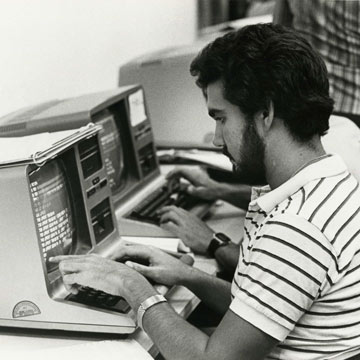
Advancement and Opportunity
To kick off the 1990s, the College initiated comprehensive reforms to academic programs and administrative operations. Academic core and electives were modernized for a curriculum to meet the needs of a dynamic community. Advancements were not limited to academics; improvements were also made to human resources, maintenance operations and budgeting. In addition, the College’s new Technology Master Plan emphasized both academic and administrative computing. Throughout the decade, the College sought to keep pace with the changing economy and workforce, developing strong partnerships in business and industry. More than 50 new degree and short-term certificate training programs were developed, all aimed at emerging industries and South Florida’s job market.
In 1990, a fifth campus opened in Homestead with just 350 students. Classes were held in the basement of the First Baptist Church. The next year, a modern campus facility would be built to serve the growing student population in southern Miami-Dade County.
The College established its Cultural Affairs department in 1990, tasked with producing and presenting the newest, most challenging contemporary and cultural-specific works with an emphasis on creations reflective of Greater Miami’s multi-ethnic community.
Also in 1990, the College launched the Cultura del Lobo performing arts series, later renamed Live Arts Miami. The series would become celebrated as Miami’s most eclectic performing arts series, presenting artists from across the globe.
In 1992, the College became the first community college in the country to establish an Endowed Teaching Chair program. More than 300 faculty have been recognized with the honor since.
In 1995, MDC’s aviation school was officially renamed the Eig-Watson School of Aviation after Lois Eig-Watson, once a flight student herself and a former faculty member at Kendall Campus. The school had been a pioneer in aviation education since its beginnings in 1961.
Jazz at Wolfson Presents started entertaining audiences in 1998 by showcasing renowned musicians to educate jazz students and to offer a cultural experience for the entire college community and the people of Downtown Miami. The popular program is now in its 24th season.
The College's sixth campus became a reality in 1998 when the InterAmerican Center in Little Havana was granted campus status by the District Board of Trustees
Virtual College began in 1997, later renamed MDC Online, allowing students to take classes remotely. Recognition soon followed when Yahoo! Internet Life proclaimed the College “WIRED” and voted it “second best of all colleges and universities.” The College’s information technology efforts also gained residence in the Smithsonian’s permanent collection with the nomination for the ComputerWorld Smithsonian Award for Technological Innovation in 1998.
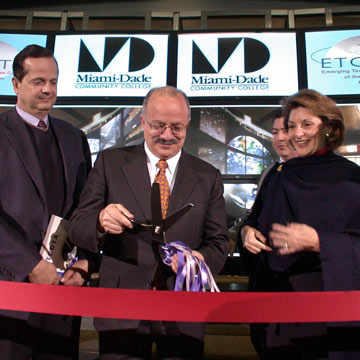
The New Learning Agenda
The College kicked off the new millennium by enrolling its 1 millionth student and obtaining state approval to offer bachelor’s degrees. The College also launched its new “Learning Agenda” to advance contemporary learning models and student support programs, as well as campus, faculty and leadership development efforts.
In 2002, the City of Miami turned the historic Tower Theater over to the College to operate as a movie theater and cultural center. Originally opened in 1926, the popular neighborhood theater was the first in the county to offer Spanish subtitles for English-language movies, beginning in 1960, in recognition of the rapidly rising Cuban refugee population. (The city ended this relationship in 2022.)
In 2003, the Florida Legislature formally approved the school’s name change to Miami Dade College (MDC). That was also the year that the College began offering four-year degrees.
The Hialeah Center became the Hialeah Campus in 2004, MDC’s seventh campus.
Also in 2004, the College acquired Miami Film Festival from Florida International University. This international film event serves as a major film showcase for world cinema and has become renowned for championing films made by the South Florida community, first-time feature filmmakers and International Feature Film submissions to the Academy Awards. Miami Film Festival will celebrate its 40th anniversary in 2023.
In 2005, MDC awarded its first bachelor’s degrees.
The Honors College opened to academically gifted students in 2005. Students receive the prestigious Honors College Fellow Award, which provides free tuition and fees as well as a generous stipend for books and other expenses. The Honors College prepares students for transfer to many of the most prestigious colleges and universities in the nation, and was once referred to by TIME magazine as an “Ivy Stepladder.”
Also in 2005, MDC became the proud steward of the historic Freedom Tower, which would become home to the College's Museum of Art and Design (MOAD) and MDC Special Collections. Completed in 1925, the building was originally the home of the Miami Daily News, the city’s oldest newspaper. The “Ellis Island of the South” served as the Cuban Assistance Center from 1962 through 1974, offering nationally sanctioned relief to the Cuban refugees seeking asylum. One of those refugees was then-teenager Eduardo J. Padrón, who would later become president of the College in 1995. The Freedom Tower was designated a National Historic Landmark in 2008.
West Campus, the youngest of MDC’s eight campuses, opened in 2006 in Doral with just 150 students.
In 2008, MDC’s Medical Campus began offering a Bachelor of Science in Nursing in response to workforce needs in that industry. The School of Nursing had been established in the early years of the College and has graduated more than 23,000 nurses since. In 2012, the school would be renamed the Benjamín León School of Nursing.
MDC TV debuted in 2008 as the College’s own television network. MDC TV is broadcast to millions of cable TV subscribers throughout Miami-Dade County and has won many Emmys and nominations from the Suncoast Regional Chapter of the National Academy of Television Arts & Sciences.
In 2009, The Carnegie Foundation for the Advancement of Teaching named MDC among the select group of institutions granted its prestigious Community Engagement Classification.
Also in 2009, MDC took over the Lynn and Louis Wolfson II Florida Moving Image Archive, the nation’s largest state archive of video and film.
Opened in 2010, the Miami Culinary Institute (MCI) at MDC is at the epicenter of culinary education excellence. Mixing classic skills and innovative techniques used by the world’s best chefs, the program is at the forefront of the industry. MCI has won several awards and distinctions, and has also been home to world-renowned chefs.
In 2010, Miami Dade College celebrated its 50th anniversary.
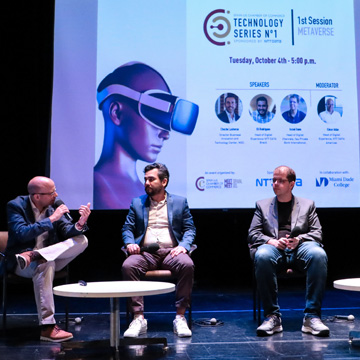
Innovation · Expansion · Purpose
Over the next decade, MDC would take higher education innovation to entirely new levels with groundbreaking initiatives and curricula that would evolve in sync with local industry as well as the global workforce. By 2011, the College was offering more than 20 baccalaureate degrees including a new Bachelor of Science in Biological Sciences.
MDC was selected for a Bill and Melinda Gates Foundation Completion by Design grant in 2011 to increase student success and boost graduation rates among low-income students.
Also in 2011, the College began offering its unprecedented American Dream Scholarship, which pays for in-state tuition and fees for the first two years of college for all newly graduated high school students who could not otherwise afford it. Graduating seniors must have a minimum 3.0 GPA to qualify.
The Koubek Center was acquired by MDC in 2011. Built in 1929, the South Florida landmark has a long and rich history as a cultural hub dedicated to building community through the arts with a 200-seat theater, an expansive garden, classrooms and multi-use spaces.
In 2012, the College became the first institution of higher learning in Florida to offer a Bachelor of Applied Science in Public Safety Management.
In 2013, the College enrolled its 2 millionth student.
The President’s Higher Education Community Service Honor Roll is the highest federal recognition a college or university can receive for its commitment to volunteering, service learning and civic engagement, and in 2013, MDC received its seventh consecutive accolade.
In 2014, the Student Success Award of Excellence was conferred on MDC by the American Association of Community Colleges (AACC) for advancing diversity.
In 2015, MDC opened the new 9,000-square-foot, state-of-the-art Miami Animation & Gaming International Complex (MAGIC). The facility is a working animation studio where students prepare for careers as creative directors, graphic artists, illustrators and 2D and 3D animators. MAGIC offers an intensive, hands-on program where students have the opportunity to work with industry powerhouses such as Nickelodeon and Telemundo. They also gain hands-on experience in augmented and virtual reality (AR/VR).
Ashoka U designated MDC as a 2015 Changemaker Campus for its role in promoting social innovation, change-making and thought leadership in the Miami community and abroad.
MDC launched its cutting-edge Miami Fashion Institute (MFI) in 2016. Located at the Wolfson Campus in the heart of Downtown Miami, it is the only facility of its kind at a public institution of higher education in Florida, and one of only a handful nationally. Real-world experience meets the classroom with faculty that includes renowned artists, designers and business professionals. MFI offers Associate in Science degrees in both Fashion Design and Fashion Merchandising, as well as a College Credit Certificate in Pattern Making and Construction.
The Idea Center at MDC opened in 2016 as an “industry-agnostic ecosystem of creativity, innovation and entrepreneurship for MDC students.” The Idea Center offers classroom education, professional development opportunities and experiential learning programs to MDC students and the community at large.
Also in 2016, MDC acquired the historic David W. Dyer building, which is being restored for academic and civic purposes. Built in 1933, the building is on the National Registry of Historic Places and on the City of Miami's list of historic places.
In 2017 MDC was selected to join the exclusive Frontier Set, a group of higher education institutions aiming to eliminate the racial, ethnic and socio-economic barriers that bar students from completing college.
MDC’s business school was renamed in 2018 the Miguel B. Fernandez Family School of Global Business, Trade and Transportation in honor of billionaire entrepreneur and philanthropist Miguel “Mike” B. Fernandez, a longtime friend and advocate of the College.
MDC’s Cybersecurity Center of the Americas opened in 2018 to address the demand for cybersecurity professionals. MDC is the only institution of higher learning in Florida with a Cyberbit range, a training facility that provides students and working professionals access to hands-on cybersecurity education and simulated training that mirrors real-life cyberattack scenarios.
In 2019, Tesla chose MDC as its first partner in the state of Florida for its Tesla START automotive training program. The 15-week Tesla START program trains students to become Tesla automotive technicians at a new state-of-the-art facility at West Campus, fully equipped with Tesla vehicles and equipment and built to Tesla specifications.
Building on its outstanding record, MDC once again made The Chronicle of Higher Education’s Great Colleges to Work For in 2019, marking its 11th consecutive year on the list.
MDC opened its new Cloud Computing Center in 2019. The state-of-the-art Center is the only one of its kind in Florida, and offers the state’s only College Credit Certificate and Associate in Science in Enterprise Cloud Computing. It also hosts the College’s first Cloud Computing Academy, which provides training for both MDC students and members of the community. In collaboration with Amazon Web Services (AWS), Microsoft, Azure and Google Cloud, among others, the new Center allows technology leaders and industry experts to engage with students who are learning about leading cloud platforms and receiving industry certifications.
In 2019, MDC opened the new Center for Learning, Innovation and Simulation (CLIS) at Medical Campus. The five-floor Center features an entire floor dedicated to advanced medical simulation that facilitates the practice of working in real-world clinical environments such as operating and emergency rooms. CLIS is a one-of-a-kind health training venue in the region and rivals those at top medical schools around the nation.
MDC was awarded the 2019 Aspen Prize for College Excellence, the nation’s highest recognition of achievement and performance among state colleges across America. The award is considered the highest and most sought after among American colleges.
MDC was also awarded the 2019 Lumina Foundation Education Innovation Judges Choice Prize for its adult learner “earn and learn” Tesla START program.
Also in 2019, after the College's fourth president, Eduardo J. Padrón, announced he was stepping down, the InterAmerican Campus was renamed the Padrón Campus in honor of his part in developing the location as a campus.
MDC opened its new cutting-edge BIT Center in 2020. The 6,000-square-foot facility is a cross between a Silicon Valley tech company and a futuristic classroom. The BIT Center examines and promotes the role of technology in digital transformation, process automation and analytics in the ever-changing business landscape.
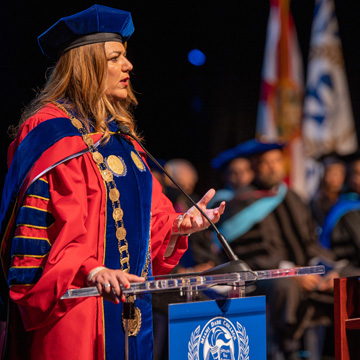
A New Era of Academic Excellence
In 2020, Madeline Pumariega was named the first female president to lead Miami Dade College. Adding to the historic nature of this appointment was that Pumariega is an alumna of MDC.
The School of Engineering and Technology (EnTec) at MDC announced two new degrees in 2021: Bachelor of Science in Information Technology and Bachelor of Science in Cybersecurity. The College has developed more than 50 new or revamped degrees and embedded over 30 industry certifications into tech-related courses for these sought-after skills.
In 2021, MDC joined the AI4ALL College Pathways program, a nationwide initiative to foster AI-related careers and to embed AI concepts into all associate degree curricula in coming years.
MDC launched Rising Black Scholars in 2021. The trailblazing initiative provides a full-ride scholarship and a host of curated services for two years to students of African descent who are graduates of a Miami-Dade County high school.
In 2021 MDC’s award-winning newspaper The Reporter was named the top college student newspaper in Florida for the 10th year in a row by the Florida College System Publications Association (FCSPA) The print publication was launched in 2010 and is a product of three now-defunct student newspapers at MDC: The Falcon Times launched in 1961, followed by the Catalyst in 1966 and The Downtowner in 1970, which was renamed the Metropolis — a magazine that still exists today. Through the years, the College’s student newspapers have won many National Pacemaker Awards and received hundreds of honors from the FCSPA.
The Goldman Sachs 10KSB celebrated its 21st cohort at MDC in 2021. The practical education program provides entrepreneurs with valuable skills for growing their businesses at no cost. Since the program’s inception at MDC in 2013, 10KSB has graduated over 500 small-business owners.
In 2021, Excelencia in Education, the nation’s premier authority on efforts accelerating Latino student success in higher education, recognized MDC with its Seal of Excelencia. That same year, the College was also recognized by the U.S. Department of Education as one of the leading institutions for Hispanics in the United States.
MDC once again ranked No. 1 in the Florida College System (FCS) for reporting the most students earning industry certifications during the 2021 reporting year.
In its continuing efforts to provide greater access, MDC launched the Presidential Scholars Program in 2021. This initiative offers high-performing graduating high school students in Miami-Dade County the opportunity to complete an associate degree at no cost.
MDC established a transfer articulation agreement in 2021 with the University of Miami (UM) that allows MDC graduates with a Bachelor of Science in Data Analytics to seamlessly transfer to a Master of Science in Data Science at UM.
According to the 2021 rankings released by U.S. News & World Report, MDC’s School for Advanced Studies (SAS) was ranked the fifth best high school in the United States and the best high school in Florida. SAS takes pride in its diverse student population, nurturing learning environment, and commitment to providing all students with a rich and rigorous liberal arts education, with many of its students specializing in STEM.
In 2021, MDC’s women’s volleyball team won their 12th state championship in 16 years. The team has won a total of 48 state titles and 11 national titles overall with back-to-back NJCAA National Championships in 2017 and 2016. And, for the first time since 2014, MDC’s baseball team was crowned state champions in 2021. Prior to that, MDC baseball won two national titles: in 1964 at Dade North and in 1981 at Dade South. In all, MDC baseball teams have made 13 trips to nationals since first qualifying in 1964. MDC’s long history of athletic excellence boasts 35 NJCAA national titles, including 15 in women’s sports, and dozens of All-Americans.
The College joined the NASA Florida Space Grant Consortium (FSGC) in 2021, a statewide network of colleges and universities supporting the expansion and diversification of Florida’s space industry through grants, scholarships and fellowships to students and educators in Florida.
By 2021, MDC had conferred more associate degrees than any other community college in the country. And among all large postsecondary Institutions, MDC ranked No. 1 in associate degrees awarded to Hispanics; No. 4 in associate degrees awarded to Black students; No. 1 in associate degrees in Liberal Arts and Sciences, General Studies and Humanities; and No. 5 in associate degrees in Nursing and Health Professions & Related Sciences.
- Nearly 14,000 graduates from MDC’s eight campuses earned degrees for the 2020-21 academic school year.
- The College’s eight campuses and outreach centers offer more than 300 academic pathways, associate and bachelor’s degrees, and career certificates.
- MDC is one of the most diverse institutions in the nation with 164 nations and 53 languages represented in its student body.
In 2022, MDC was designated a National Center of Academic Excellence in Cyber Defense (CAE-CD) by the National Security Agency (NSA) for its robust cybersecurity curriculum, the very highest designation of its kind. The College also received validation from the NSA for the Associate of Science in Cybersecurity through 2027. Those developments took place as the College launched and continued expanding MDC Tech, its unified brand and comprehensive strategy that combines all its cutting-edge tech educational offerings with the growing tech community’s needs.
Also in 2022, MDC inaugurated its Artificial Intelligence (AI) Center at North Campus, a state-of-the-art facility designed to prepare tomorrow’s AI workforce, upskill existing professional and elevate AI awareness in Miami through classes, workshops, lectures and other activations.
Its conception and vision are the product of a strategic partnership with industry giants like Microsoft, Intel and IBM.
From its earliest beginnings, Miami Dade College has been at the forefront of innovation and cultivating opportunities in an ever-changing career landscape. The College’s efforts have created new generations of professionals trained and encouraged to pursue their passions and discover their purpose for a life of career success.
Miami Dade College Presidents
Kenneth R. Williams
Tenure: 1959 – 1962
Peter Masiko Jr.
Tenure: 1962 – 1980
Robert H. McCabe
Tenure: 1980 – 1995
Eduardo J. Padrón
Tenure: 1995 – 2019
Rolando Montoya
Interim President
Tenure: 2019 – 2020
Madeline Pumariega
Tenure: 2020 – present
